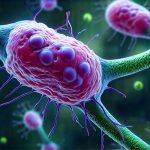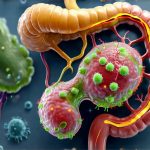The intricate relationship between diet and gut microbiota is increasingly recognized as fundamental to overall health. For decades, nutritional research focused largely on macronutrients – fats, proteins, and carbohydrates – but the spotlight has firmly shifted toward the microbiome, the vast community of microorganisms residing in our digestive tract. This ecosystem isn’t simply a passive bystander; it actively participates in digestion, immune regulation, nutrient absorption, and even mental well-being. Disruptions to this delicate balance, termed dysbiosis, have been implicated in a wide range of chronic diseases. While fiber often takes center stage in discussions about gut health, the roles of electrolytes – specifically sodium and potassium – are gaining traction as significant influencers on microbial composition and function.
Historically underestimated, dietary sodium and potassium intake profoundly affects more than just blood pressure or fluid balance. These minerals play crucial roles in maintaining osmotic gradients, nerve impulse transmission, and cellular functions—all processes that indirectly impact the gut environment. High-sodium diets can alter intestinal permeability, potentially leading to “leaky gut” syndrome, while imbalances between these two electrolytes can affect microbial diversity and metabolic activity. Understanding how these dietary components interact with our gut flora is essential for developing targeted nutritional strategies to promote a healthy microbiome and overall wellness. It’s important to note that the ‘ideal’ levels of these minerals vary significantly based on individual factors like genetics, activity level, and pre-existing health conditions.
Sodium’s Impact on Gut Flora Composition & Function
Sodium, in appropriate amounts, is vital for life. However, modern Western diets are often characterized by excessive sodium intake due to processed foods and added salt. This surplus can have detrimental effects on gut microbiota. – A high-sodium environment has been shown to favor the growth of certain bacterial species while suppressing others, leading to reduced microbial diversity. Specifically, Firmicutes tend to thrive in high-salt conditions, potentially contributing to inflammation and metabolic disorders. – Increased sodium levels can disrupt the mucus layer that protects the intestinal lining, increasing permeability and allowing harmful bacteria or undigested food particles to enter the bloodstream, triggering an immune response. This phenomenon is linked to chronic inflammatory diseases like Inflammatory Bowel Disease (IBD).
The mechanisms behind these effects are complex. Sodium influences the expression of genes within gut bacteria, altering their metabolic pathways. For instance, some bacteria utilize sodium transport systems to survive in high-salt environments, gaining a competitive advantage over others. Furthermore, excessive dietary sodium has been linked to decreased production of short-chain fatty acids (SCFAs), such as butyrate, which are essential for maintaining gut health and providing energy to colonocytes (cells lining the colon). Reduced SCFA levels impair gut barrier function and weaken immune defenses. Studies have also indicated that high salt intake can promote the growth of pro-inflammatory bacterial strains while suppressing beneficial ones like Bifidobacteria and Lactobacilli.
Beyond direct effects on microbial composition, sodium influences intestinal motility – the movement of food through the digestive tract. Altered motility can affect the time available for bacterial fermentation and nutrient absorption, further impacting gut health. Essentially, a chronically high-sodium diet creates an environment that favors dysbiosis and compromises gut barrier integrity. This isn’t just about avoiding adding salt to your meals; it’s about being mindful of hidden sodium content in processed foods, fast food, and even seemingly healthy options like canned soups and pre-made sauces.
Potassium’s Counterbalancing Role & Synergy
Potassium is often considered the counterion to sodium, playing a crucial role in maintaining fluid balance and nerve function. However, its impact on gut microbiota extends beyond simple electrolyte homeostasis. – Adequate potassium intake appears to mitigate some of the negative effects of high-sodium diets by promoting microbial diversity and strengthening the gut barrier. Potassium influences bacterial growth by affecting intracellular pH and osmotic pressure within the intestinal environment.
Potassium deficiency is surprisingly common in Western populations, often linked to low fruit and vegetable consumption and increased processed food intake (which tends to be high in sodium but low in potassium). This imbalance can exacerbate the negative effects of a high-sodium diet, further disrupting gut flora composition. Studies suggest that increasing potassium intake – through dietary sources like bananas, sweet potatoes, spinach, and avocados – can enhance the abundance of Bifidobacteria and other beneficial bacteria. These microorganisms contribute to SCFA production, improve gut barrier function, and modulate immune responses.
The ratio between sodium and potassium is arguably more important than absolute intakes of either mineral. A low sodium-to-potassium ratio (ideally below 1:2) is associated with better gut health and reduced risk of chronic diseases. This highlights the importance of focusing on increasing potassium intake alongside reducing sodium consumption, rather than simply trying to cut back on salt alone. Dietary strategies that prioritize whole, unprocessed foods rich in both nutrients are most effective for restoring a healthy electrolyte balance within the gut environment.
The Interplay with Gut Permeability & Inflammation
Gut permeability, often referred to as “leaky gut,” is a key factor linking dietary sodium and potassium levels to overall health. High sodium intake can directly compromise the tight junctions between intestinal cells, increasing permeability and allowing unwanted substances to pass into the bloodstream. This triggers an immune response, leading to chronic inflammation. – Potassium, on the other hand, helps maintain the integrity of these tight junctions and strengthens the gut barrier function.
Inflammation is a double-edged sword. While acute inflammation is necessary for healing, chronic inflammation underlies many modern diseases, including IBD, autoimmune disorders, cardiovascular disease, and even mental health conditions. The gut microbiome plays a critical role in regulating inflammation. Dysbiosis caused by high sodium/low potassium diets exacerbates inflammatory responses by promoting the growth of pro-inflammatory bacteria and reducing the production of anti-inflammatory SCFAs.
Furthermore, inflammation itself can further disrupt the gut barrier, creating a vicious cycle. By restoring microbial balance through dietary interventions – focusing on reduced sodium intake, increased potassium consumption, and fiber-rich foods – it’s possible to reduce inflammation, strengthen the gut barrier, and improve overall health. Addressing electrolyte imbalances is therefore not just about physiological function; it’s about supporting a healthy gut microbiome and mitigating chronic inflammation. This emphasizes the importance of a holistic approach to nutrition that considers the complex interplay between diet, gut flora, and immune function. And understanding the effects of common medications is also crucial for overall wellbeing. Finally, consider the impacts of long-term constipation.


















